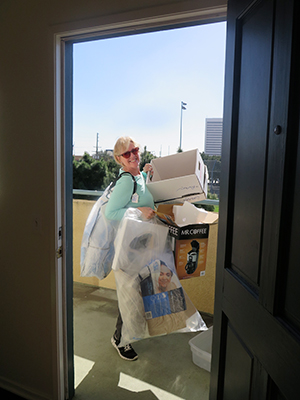
“It’s the little things…”
Transitional housing accommodations, very welcome first residences for people moving out of homelessness, can be stark, institutional places. But an all-volunteer group is working quietly and effectively to change that.
Take, for example, the story of a 60-year-old single father of two. He arrived at his first new apartment after a long day of bus rides during which he juggled two young kids and their modest belongings. He said walking into a fully furnished apartment made cozy and home-like was overwhelming. Finding the refrigerator neatly stocked with a week’s worth of groceries brought him to tears. He could breathe, he said, for the first time in a long while, his family taken care of for the moment.
The work of Topanga Women’s Circle demonstrates how much it’s the little things that can make such a big difference. “I like to think that we empower the people we help by giving them a sense of pride in their home,” said co-chair Linda Ilsley. The group regularly collects donations of bedding, furniture, clothing, toys, groceries and toiletries and then sets up house for families transitioning out of homelessness. Working with partners at Venice Community Housing and Westwood Transitional Village, the volunteers have three days to transform an empty apartment. They purchase food and stock fridges and cupboards, move in furniture and bedding from their weekly donation bin, purchase age appropriate books and toys, and set out new pajamas for the whole family. Everything is arranged by day three, including color-coordinated rooms, a washable satin robe for each mother, and other thoughtful little touches of home easily taken for granted, but meaningful when life has been lived on the street or in shelters. When it’s time for the occupants to transition to permanent housing, they get to take all of their new belongings with them to fill their new, permanent home.

TWC started at Community Partners in 2008. They helped about 40 homeless families last year—eight times the number from when they first began. Being under fiscal sponsorship has served them well. “As a young and growing charity, our knowledge of how to grow and how to build an advisory board, how to fundraise, etc. was limited. But with Community Partners – the advice, the seminars -- we’ve learned so much.”
The project continues to run as an all-volunteer effort, and it’s a model about which Ilsley has some advice: “Make sure every single volunteer understands that she, or he, is a critical and key component in the success of the charity. I wish I had known in the beginning that everyone’s contribution should be acknowledged.”
For such a hands-on group – volunteers gather in sewing circles to make stuffed animals and craft Mother’s Day cards for fundraising efforts – they take a very hands-off approach when it comes to those they serve. With an understanding of the trauma that comes with homelessness, they prefer to maintain a low profile, offering dignity and comfort through the welcoming environments families can claim as their own. They don’t seek out gratitude.
“It can be hard for families, especially when a father is part of the family, not to feel a little embarrassed at our generosity. We just don’t like putting people in that position. We try to be silent donors and get in there before the family arrives so that when they move in, they feel like they’ve stepped into a wonderful fairy tale where life is suddenly a little sweeter.”

